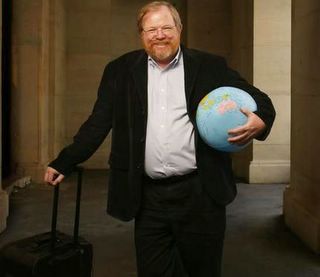 Work for Hire?
Work for Hire?New blogger Lynn Scanlon has recently stirred up the pot with her post about advances and flat-fee work for book projects. MediaBistro has been all over the controversy with comments and criticism coming in from all directions.
When you are selected to write a book (guidebook, whatever), should you take a flat fee or a royalty, and should you request a large flat fee, or advance, on signing or should you decline the flat fee/advance for a somewhat higher royalty rate?
I've done all of the above, and feel that a high royalty rate without an advance is the best way to go. Flat fees are a suckers game. Insist on royalties. If your book sells well, then you will make longterm decent money that continues to roll in over the years. And if it doesn't sell well, you probably should have found a different book project.
Writers should assume the same risks and rewards as the publisher, who must pony up the money upfront for printing costs, editorial work, and sales, promotion, and distribution.
Here's Lynnnnnnnnnnnnnnnnnnn.. sort of like Jack in the Shining where he types for six months: all work and no play makes Jack a dull boy. all work and no play makes Jack a dull boy: Lawrence LaRose neatly ducked a question thrown at him today while he gave a talk about his 2004 book Gutted Down to the Studs in My House, My Marriage, My Entire Life at the Rogers Memorial Library in Southampton, New York.
He was asked how well the book was doing. Amazingly he didn't blink. He didn't get dodgy-eyed.
Gutted is selling as a used book on Amazon for $1.23.
LaRose's 1996 book, The Code: Time-Tested Secrets for Getting What You Want from Women -- Without Marrying Them, is selling on Amazon for $.30.
He wanted $20 for the hardcover version of Gutted, a few copies of which were available on a table nearby. I offered him $10. He said: "But you're an author, too." (Like I'm supposed to show some sympathy.) I pointed out to him that I could buy the book for $1.23 online!
Sold: $10.00!
Cruel and heartless though I may be toward a fellow author, I know he is just learning a lesson that I learned a long time ago, and moved over into the business side of publishing. The retail price of a book is meaningless. There is no money in publishing for the vast majority of authors. Having a book sell more than 100,000 copies is as difficult as making an NBA team.
I read somewhere, and I believe it. My titles sold very well. Maybe his first book did, too, since he smartly spoofed and rode the coattails of The Rules: Time-Tested Secrets for Capturing the Heart of Mr. Right on the publicity circuit and onto a sofa beside Oprah. But just because you sell tens of thousands of copies or even hundreds of thousands of copies, doesn't mean the big checks will roll in for the author. Not like they do for the publishing house. Read the contract.
What's an advance against royalties, really? It's a loan. Something you have to pay back before you see a dime more. Yes, there is the possibility that enough copies will be sold at high enough prices and you'll receive the maximum royalty, and you may actually manage to "pay back" that loan, but the likelihood is slim, slim, slim.
And that's the way publishers like it. The contract is designed to fill the coffers of the publishing house, not the polka-dotted, porcelain piggy bank of the author.
Here's what I recommend for authors today. Don't accept an advance against royalties. (Yippee! A $100,000 advance against royalties! OK, make it $10,000.) Surprise! It's doled out upon signing the contract, turning in an "approved" manuscript, being published, and (horrors!) reaching the sixth month mark after the pub date if the publishing house can get away with it. Get a check upfront as payment in full. Say the magic words "work for hire." You can take less than the $100,000. (What? Give up $100,000?!) Money you have in your hand today is worth much more than money tomorrow.) The size of the check you are offered will indicate the kind of support your book will get.
The Publishing Contrarian Link
****************************
And MediaBistro readers send in their responses.Your comments on this morning's post about Lynne W. Scanlon's advice to authors to forgo advances and take a one-time payment from publishers for their books are coming in...and you're not exactly enthused over the idea. "There are so many reasons this is stupid tenumeratet even begin to ennumerate them," writes one agent. "Seriously. And I'm a guy who tends to like contrarian ideas. Maybe if you're talking about a certain kind of gimmick-driven nonfiction this makes a certain degree of sense. But for the vast number of authors, this amounts to giving away the author's piece of the future for a smaller piece of the present, which literally makes no sense."
Literary agent Janet Reid calls Scanlon's proposal "interesting," but outlines some key objections: "First, there are tax issues; all the money up front means it's all taxable in that QUARTER: 30% right off the top. Second, publishers pay advances based on what they think the book will earn... Third, this completely ignores smaller publishers who depend on paying future royalties for a book rather than big up front advances (let alone bigger up front work for hire paychecks)."
Some folks took issue with Scanlon's characterization of advances as loans. "Is there something here I'm not understanding?" asks one reader. "A loan is money given to you so that later, you pay it back." Bestselling author Tess Gerritsen provides further clarification: "It's NOT a loan (at least, it isn't in any of my contracts). It's money I get to keep, even if only ten copies sell." And, she points out, the size of the advance is a strong indicator of how much marketing push the publisher will give your book when it comes out. "If they give you a seven-figure advance, do you think they're gonna let that book die in the stores? No way. They'll throw more money after it, in advertising and promotions, to ensure their big investment doesn't flop."
Not everyone hates Scanlon's idea, though. One publishing exec says it has "a lot of merit," and asks, "Since a publisher is taking on all the risk, why should the publisher share the profits should the book take off?" He looks to the music industry for inspiration, citing the work-for-hire approach adopted by Naxos Records to produce budget-priced classical music CDs for "a slow-growth/no-growth, overpopulated market" that he views as comparable to contemporary publishing. "You need to keep costs as lean as possible and make smart pricing decisions," he says. "Naxos's model is one the book industry should consider studying."
MediaBistro Link 1
And here's some more reaction from MediaBistro readers.Readers are still reacting to Lynne Scanlon's comments about work for hire, leading to a third wave of letters coming in. "I still don't get her point," says Tess Gerritsen. "Since advances are calculated partly on how many copies the publisher thinks will sell, how is that different from 'work for hire' where the publisher pays a flat fee based on how many copies they think the book will sell? It's still cash on the barrel, with the obvious difference: If the book sells like gangbusters, the author benefits from that success with royalties." Gerritsen also observes that "many, if not most, top-selling authors never earn out their advances—and they have absolutely no problems negotiating their next contracts."
Mark Haskell Smith points to Hollywood for a less glamorous countermodel of work for hire. "The board of directors (and many members) of the WGA in Los Angeles have been trying for years to figure out a way to get ownership of original written material retained by writers," he says. "Right now the studios own the material and all work is work for hire. In that environment, an author could easily sell a novel to a publisher and then discover another novelist coming in to 'polish' it before it hits the marketplace. Since the original material would be work for hire, the publisher would own it and could, basically, do whatever they want." For that matter, I'm sure that comic book authors and artists would have an interesting perspective on the work for hire debate as well...
The executive who expressed support for the idea returned to clarify his comments about publishers taking all the risk. "I'm simply pointing out a fact," he writes. "In the writer-publisher relationship, the publisher takes on the financial risk. The writer gets paid no matter what. The publisher is spending money in the hope of a return. Many books post losses. In my experience, most writers don't try to live on their writing income, so it's not correct to characterize their activity as risking a financial loss. They are not 'in business' in the same way a publisher is."
The debate continues over at Scanlon's Publishing Contrarian, including her "bottom line" rationale for why her approach is right: "Ten-thousand-copies-sold is often enough, no MORE than enough, for a publishing house to be happy. In fact, very happy... It's the 10,000 copies here, 10,000 copies there, that are the bread and butter sales for a publishing house, but not for the author."
MediaBistro Link 2
And then Scanlon responds to her critics, with a new post and commentary at MediaBistro. She must be loving this.Contrarian Rebuts Your Criticisms
Publishing Contrarian Lynne W. Scanlon responds to some of yesterday's letters reacting to her recommendation that writers embrace the "work-for-hire" compensation model when dealing with publishers. An agent pointed out that getting all the money up front meant it would all be taxable in one quarter; Scanlon replies, "Most advances are tiny and most writers have more than enough write-offs to offset the tax issue. Stretching a $10,000, $25,000 or even $40,000 advance over a year or two years or three, rather than getting the cash in hand (when it isn't much to live on anyhow) makes no sense to me if you want to pay your bills." In response to Tess Gerritsen's observation that an advance against royalties isn't a loan, in the sense you don't have to pay it back if the book doesn't sell enough copies, she retorts, "If you 'default,' so-to-speak, and do not 'earn back' your advance, best of luck with your next contract!"
But it's actually the comments from a publishing executive who appreciates Scanlon's idea that drew the most response yesterday afternoon. "Of course a publishing executive thinks that going to a work-for-hire model has a lot of merit," replies one agent. "Publishers have always wanted the ability to control the intellectual property of an author without strings attached." In response to the executive's claim that publishers take "all the risk" on books and shouldn't have to share the profits, writer and industry educator Bella Stander (at whose "Book Promotion 101" workshops, I should disclose, Sarah and I are both scheduled to speak) says, "I find this singularly arrogant. As we know, the author takes a huge financial risk by writing a book." Another reader concurs, "Without the author's time, there would be no book, no book signings, etc. If the author doesn't make enough on their investment, there may be no second book. Both the publisher and the author need to make money and both need to be rewarded if the book takes off."
That same executive cited budget-CD label Naxos as a model for publishing work-for-hire content, prompting one of the agents who first wrote in to return with an additional comment. "Naxos is a great model," he says, "if you don't mind skipping over the best (or even the second best) talent. For the most part, Naxos uses third-rate orchestras with middling grade talent to produce cheap recordings. Most writers I know want to be considered first-rate, and they want to be treated that way."* Janet Reid also came back to respond to this line of reasoning: "Naxos pays musicians on a work-for-hire basis, not composers. Musicians are not the creators of work like writers are creators of a novel, and most of the composers Naxos records are well beyond collecting royalties given they died not just in the last century but the century before that!"
*Exceptions to the rule exist: Marin Alsop's excellent work with the Bournemouth Symphony Orchestra on John Adams and Philip Glass, for one, and the 3-CD set of William Bolcom's Songs of Innocence and of Experience for another... (See, we don't just know books here at GalleyCat!)
MediaBistro Link 3




